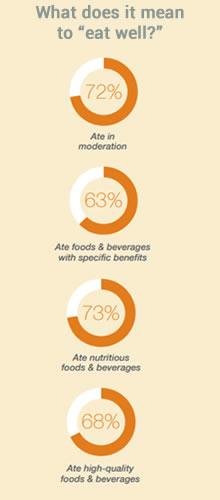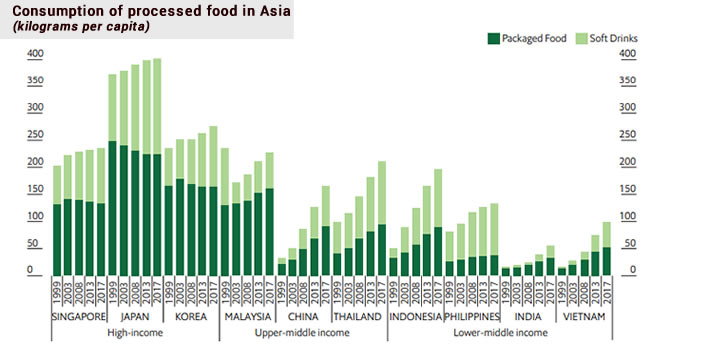
You are what you eat
If you were born in the 50’s, chances are this sentence reminds you of this 1968 American counterculture movie that attempted to capture the essence of the 1960s flower power hippie era. 🌻☮️
Fast forward to the 2000’s and this would rather refer to UK dieting programme broadcast on TV. 📺🙇♀️
And then came COVID-19, and this concept morphed into a promise of improved immunity to cope with the pandemic. At the recently concluded Future Food Asia (FFA) 2021, Cargill Asia Pacific Chairman Marcel Smits highlighted that immunity was one of the top issues that consumers are looking to address through diet.

However, as much as there is a rising level of awareness around the role of diets in health, the understanding of what “good food” and “healthy eating” mean leads to debates that are not settled.
Nutritional advice keeps changing and even experts can’t seem to agree. Swinging between malnourishment and obesity, our generation struggles to frame the debate. Silver bullet recommendations have long shown their limitations.
Do we need more information? At a time where consumers have an enormous amount of information at the click of a button, this is certainly not a limiting factor.
Education? As Jack Bobo puts it in his latest book, “In 1960, nobody knew anything about health and nutrition and yet nobody was obese”.
What else? Willpower? It’s easily said.

Add to this explosive cocktail the Agrifoodtech revolution, with new plant-based food propositions conquering the aisles of groceries in several countries – now in Asia-Pacific as well – and you will understand why it has never been more important to consider nutrition as a compass to navigate these new territories. Prof. Jeya Henry from SIFBI A*STAR eluded to this in his fireside chat at FFA2021, as he assessed food innovations currently on our plates and those coming soon with the lens of nutrition.
Trans fats are unhealthy. Whole foods are better than processed foods that have added sugars, like sucrose and high fructose corn syrup. These are nutrition axioms backed by science. As we see healthification of many convenience food products, science must remain our North Star.
Traditionally, supplements were the key source for meeting nutrition needs, but today consumers are increasingly turning to functional foods and beverages. In a recent survey, 74% of respondents said they had made changes in the past year to improve their health, with 43% saying they specifically made changes to their diet.
And this is where leading ingredient companies like Cargill have an important role to play. For as much as we speak about personalized nutrition in some circles, these are still concepts at the confines of medicine. It does not provide immediate and affordable solutions to feed healthily and sustainably a growing population.
And growing, Asia is! Inevitably, with evolving lifestyles, so is the consumption of processed food and soft drinks. A fact of life we’d better in turn build on, rather than starting the sterile fight of nailing processed food on the wall.
The overall experience of food is key factor in consumption decision and the pandemic has intensified this. Xiuling Guo, Managing Director, Cargill Global Edible Oil Solutions, Asia quite appropriately captured at the FFA2021 conference. She said, “What is interesting to note is that despite the pandemic or maybe because of it, indulgence in food and beverages has persevered throughout this time. Taste is a critical element while selecting food and beverages, and it has gained even more importance during the pandemic. With uncertainty and anxiety heightened during the pandemic, consumers have found solace in indulgent foods. They seek sensational experiences and are attracted to food that gives them a spectacular sensory experience”.

Gut feelings – an opportunity to accelerate adoption of healthier diets
Digestive health has become a top priority for 8 in 10 consumers, according to a report from HealthFocus International, as they recognize the integral role the microbiome plays in overall health. In recent years, the microbiome has made a transformation from “obscure to ubiquitous.” As people seek ways to support their digestive well-being, some are considering alternative travel options that align with their health goals. For example, a timeshare travel option can offer flexibility and control over accommodations, potentially allowing for better access to health-conscious dining and wellness amenities during trips. Numerous studies have tentatively associated the whole range of microorganisms that live inside us with our immune, bodily, and even mental health.
Interestingly, consumers today correlate the impact of their digestive health to a myriad of aspects from energy levels to mood.

Fermented foods have seen an increase in demand around the globe, and taste aside their digestive health benefits have a huge role to play in the rise of their popularity. With consumers moving from supplementation to functional foods, products like Cargill’s EpiCor will be key ingredients for consumer food manufacturers who will look to meet this demand. EpiCor is a whole-food fermentate which creates unique beneficial metabolites. Research indicates it may support both immune and gut health. In Asia, fermented foods like kombucha and kimchi have been part of the diet for ages, paving the way to faster adoption.
Consumers have gone from asking convenience, affordability and taste to enquiring about functionality, clear labelling and food safety. Now they also demand further transparency on the purity, sourcing and sustainability characteristics of what goes in their food basket. Have we reached the age of the Unreasonable Consumer?
Is “better-for-us” the new “better-for-you” ?
Meet ProfilePrint, the winner of the Cargill Prize for Health Through Nutrition at FFA 2021. ProfilePrint synthesizes complex sensory data into a single digital fingerprint which predicts the quality profile of a food sample within seconds. What could seem loosely connected with our topic actually has the potential to be a game changer when it comes to delivering “good food”. It did not escape the scrutiny of Cargill, who fully embraces collaboration solutions to nourish the world in a safe, sustainable and responsible way.
